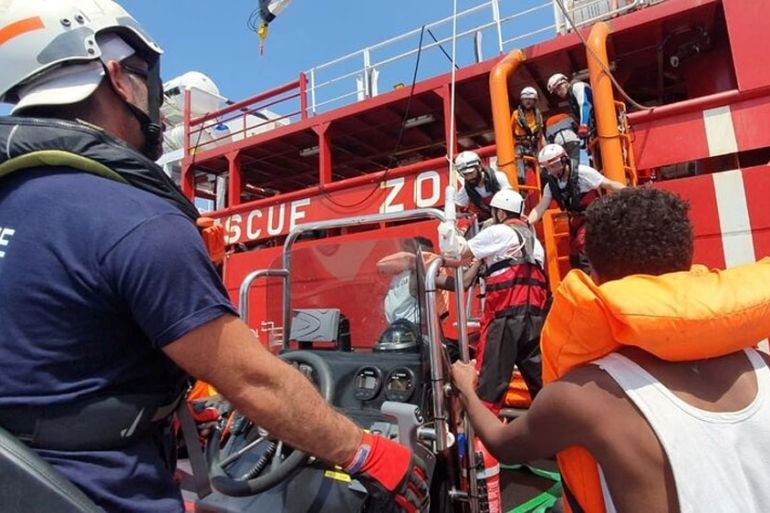Malta accepts some migrants and refugees from Ocean Viking
NGOs accuse Maltese authorities of ‘inhuman and arbitrary discrimination’ in leaving some passengers on the ship.

Malta has brought a group of 256 migrants and refugees ashore, including 36 from the Ocean Viking rescue ship, but the ship’s operators complained that the island’s authorities had refused disembarkation for more than 180 others on board.
The Maltese armed forces said that 229 of the migrants among Saturday’s arrivals were rescued from three boats in distress in Malta’s search-and-rescue zone.
Keep reading
list of 4 itemsAgadez, Niger’s gateway to the Sahara, finds new life in the migrant trade
Forced from home, these Colombians struggle to live in a basketball stadium
UN says 38 dead, including children, as migrant boat sinks off Djibouti
Another 35 people were transferred to a Maltese patrol boat from the Ocean Viking, which had rescued them in Malta’s zone.
The group was the fourth to arrive on the Mediterranean island in a week.
Doctors Without Borders (MSF), which operates the Ocean Viking, said in a tweet that 182 survivors from other rescues, including a newborn, children and a pregnant woman, remained stranded on board.
This, it said, “demonstrates the discriminatory, arbitrary and inhuman nature of a system which continues to prioritise political gameplay above human lives and dignity”.
Malta argued that those people were picked up outside the rescue zone.
This shameful decision to leave the remaining rescued people – who are all fleeing from #Libya – demonstrates the discriminatory, arbitrary & inhumane nature of a system which continues to prioritise political gameplay above human lives and dignity. pic.twitter.com/6LsbupP6Al
— MSF Sea (@MSF_Sea) September 20, 2019
The island accepted more than 300 migrants from the Ocean Viking in August on condition that they would be shared among other European Union (EU) countries, but most remain on the island, which has limited reception facilities.
The highly-publicised efforts of the Ocean Viking, run by MSF and another French charity, SOS Mediterranee, have exposed Europe’s failure to come up with a coherent policy to deal with migration from Africa through Libya.
Libya is one of the main transit countries for migrants and refugees as they try to reach Europe.
The war-torn country has become a hub for human trafficking rings that often send migrants to Europe in unseaworthy vessels.
EU member states have been at loggerheads over how to handle refugees and migrants reaching their shores since a 2015 spike in Mediterranean arrivals of people fleeing conflict and poverty in the Middle East and Africa.
On Monday, Malta will host an EU home affairs ministers meeting to discuss migration and how EU states may share arrivals.
UPDATE The #OceanViking has been instructed to transfer the 35 people rescued in the Maltese Search & Rescue Region yesterday [not 36 as previously stated], to a Maltese military vessel.
182 survivors from other rescues remain stranded on board, with no place of safety assigned. pic.twitter.com/seTk1auAkF— SOS MEDITERRANEE (@SOSMedIntl) September 20, 2019